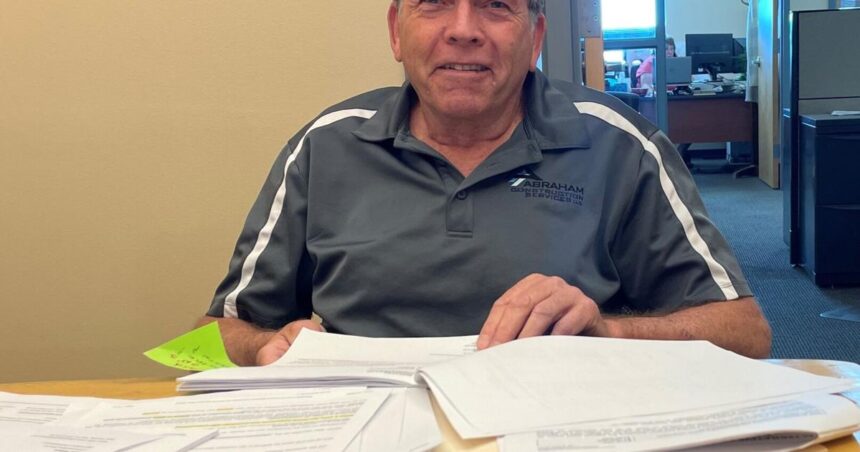A Helena-area contractor has raised questions about the bidding process the state is using in a large-scale state renovation project, saying “bundling” favors large builders and elbows out the little guy.
But state officials are adamant they are adhering to a process used for years and used by other state of Montana departments.
Rick Abraham of Abraham Construction in Clancy raised his concerns in an April 30 letter to Russ Katherman, administrator of the state Department of Administration’s Architecture and Engineering Division.
Rick Abraham, president of Abraham Construction Services of Clancy
Abraham says he has questions about the Remote and Office Workplace Study (ROWS) Implementation Project, which includes millions in renovations and other work to several state buildings.
“My main question involves the ‘bundling’ of several projects related to the overall completion of several remodels and renovations,” he wrote.
People are also reading…
“With a total present budget of $59,525,000 available, why is the state of Montana entering into a contract with one firm to complete $81 to $116 million for all this work?” he asked. “Why aren’t the jobs being budgeted and put out to bid on an individual basis based on available funds? Is it the intent of the state to continue to negotiate with the same ‘chosen GCCM’ (general contractor, contract manager) as more funds are found or become available and continue this contract until the work is complete?”
He notes at the end of his letter that “low bid contracting also verifies that the tax paying public is getting the best deal available.”
Abraham, on the cusp of retiring, said he could not understand why these jobs were being bundled and leaving smaller contractors, such as himself, out. He said he is considering legal action.
However, Janna Williams, spokeswoman for the Department of Administration, said ROWS is structured to create opportunities for smaller contractors in many ways.
“The large-scale of work will provide many opportunities for contractors of all sizes to bid on various construction needs,” she said in an email.
Williams said bundling is not a new process for the state, is transparent and that the general contractor, contract manager is contracted for preconstruction, and they also must go through the bid process to do the work.
“Since ROWS includes more than simple renovations of several buildings, the state has determined that having responsibility fall on a single contractor to provide overall construction management and contractor services is crucial to cost reduction, time savings, and a better solution for addressing the overall complexity,” she stated in an email. “Throughout the process, work will be available to contractors like Mr. Abraham.”
Abraham said he is not confused, but frustrated. And he says he has found himself in a he-said-she-said exchange with the state.
“In the past, a hardworking Montanan could start a small construction business and compete at the state level,” he wrote in another missive to the state. “Through that hard work, and dedication, that business could grow. Providing a quality product that came in at the state price was all that it took.
“However, it appears to me, (the state) has turned away from the age-old approach of vetting and bidding projects, and instead has turned to a ‘buy in bulk’ model.”
He said it appears that three contractors will get 24 separate projects through the GCCM bundling process, which he said is 39% of the budget.
Abraham said using the GC/CM process places smaller firms in a position where their only recourse is to seek legal counsel to protect their rights inside the system.
“The time has come for the State of Montana to step up and take control over the building projects they have funded and quit relying on ‘chosen’ contractors to do the work,” Abraham wrote. “The whole GC/CM system is flawed and needs to be review at the legislative level.”
ROWS will expand telework, create “hybrid” flexibility, update human resource policies and design new workspaces in buildings, officials with the Department of Administration, which is overseeing the program, said. The state expects the work to be initiated in phases throughout the next five years, with work starting on the Capitol complex in Helena.
Misty Ann Giles, director of the Department of Administration, told Lee Montana Newspapers in April the state has five major departments and three major buildings in Helena that the state is looking at doing millions in deferred maintenance on in the Capitol complex renovation, which will result in 63% of deferred maintenance in the Capitol complex being handled.
The initial agencies involved with renovation and shuffling of employees will be the Department of Administration, Department of Revenue, Department of Labor, Department of Environmental Quality, Department of Public Health and Human Services and the Department of Commerce.
The ROWS project funding is authorized as a single, enterprisewide appropriation that involves multiple campuses and was approved by the 68th Legislature, Williams, the DOA spokeswoman, said. She added the scope of the work is complex and requires complete understanding and expertise during design and planning.
She noted one contractor said it will save time, resolve complexities, increase efficiency and keeps the project within budget for the best use of taxpayer dollars.
Abraham – who has done projects for the state, such as the General Services Division shop – said the process requires any company completing a proposal be capable of bonding $50 million at the time of the proposal.
Abraham, who said he has also built several area volunteer fire stations, said very few firms are able to bond that amount.
Williams said the $50 million bond was set based on the highest projected construction cost for completion when the request for proposal was issued by the department’s Architecture and Engineering division.
“There is plenty of work to bid on under the main contractor,” she said in an email. “Please note that the main contractor is required to complete the work through a competitive bidding process within the contractor community.”
Williams said this “contractor community” would include Abraham.
Abraham said this new “buy in bulk model” adopted by the state has allowed it to “simply hire the biggest contracting company they can find to do as much work as possible.”
“I am telling you; this will not work,” he wrote in an email.
Assistant editor Phil Drake can be reached at 406-231-9021.





